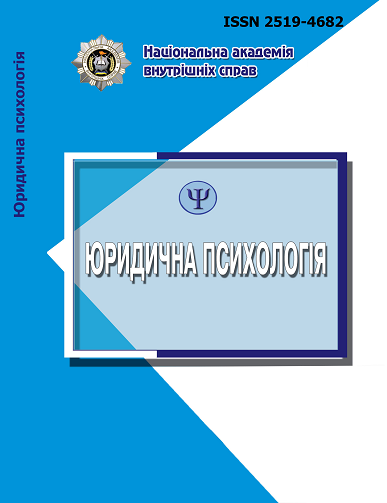Specific Features of Persons Behavior with Different Levels of Personal Anxiety in Conflict Situations
Keywords:
conflict, anxiety, style of behavior in conflict, personal anxiety, personality flexibility, strategy of psychological defense in conflict, frustration, aggressiveness, rigidity
Abstract
The article is devoted to the consideration of peculiarities of behavior in conflict situations of persons with different levels of personal anxiety. The questions of psychological factors determining the origin, dynamics and the final result of the development of interpersonal conflict, is important for understanding the psychological mechanisms of regulation of human behavior. The role of personal anxiety in the emergence and the course of conflicts is revealed. It is established that the behavior of an individual in a conflict is caused by internal and external factors. The latter include a subjective assessment of the partner’s behavior as inadmissible, low level of social and psychological competence, low level of conflict resistance, low level of empathy, inflated or undervalued levels of harassment, type of temperament, accentuation of nature, violation of the emotional and volitional sphere of personality. One of the most significant factors is personal anxiety. Situational anxiety is generated by a specific situation and often has a positive significance for the life of the individual. Personal anxiety is defined as a personality trait and is characterized by a state of unconscious fear, an uncertain sense of threat, willingness to accept any event as adverse and dangerous. The results of an empirical study on the psychological characteristics of individuals with different levels of anxiety are presented. Depending on this, the type of behavior in conflict, the strategy of psychological protection in conflicts, the style of interpersonal relations and the state of anxiety, frustration, aggressiveness and rigidity are established. In the course of the existence of a correlation between the indicators of behavior in conflict situations and the level of anxiety, the analysis of medium and high communication rates was subject. There is a certain correlation, namely: anxiety has positive correlation relations, with such phenomena as aggressiveness style of behavior in conflict situations «Rivalry». This testifies to the fact that those who are alarming, the behavior of their own style will be the rivalry that is associated with aggressiveness. Peace as a strategy for psychological protection in conflict situations correlates with anxiety, which may indicate that peacefulness as a psychological strategy for protecting the subjective reality of the individual in conflicts and in conflict situations in which intelligence plays a leading role nature. By peace, it means, a partnership and cooperation, and the ability to compromise. Avoidance as a strategy of psychological protection in conflict situations correlates with anxiety. Such a result suggests that individuals with an average level of personal anxiety are traversed without a battle from the zone of conflict and tension when the «I» personality is attacked. Such a style of interpersonal relations as «straight-aggressive» has a positive correlation with conflict. This suggests that such a style of interpersonal relationships, related to conflict, in this it is expressed. It is noted that the ideal style of personal behavior in a conflict situation does not exist, but each of them can contribute to constructive conflict resolution, depending on the situation. It is established that the style of behavior in a particular conflict is determined by the extent to which a person wants to satisfy his or her own interests (acting passively or actively) and the interests of the other party (acting in concert or individually). The basic directions of psychological and pedagogical work are determined taking into account personal and emotional factors in conflict situations, acting as a condition for their constructive solution.Downloads
Download data is not yet available.
Abstract views: 419 PDF Downloads: 4423
Issue
Section
Theoretical and methodological issues of legal psychology
- Authors reserve the right to authorship of their own work and transfer to the magazine the right of the first publication of this work under the terms of the Creative Commons Attribution License, which allows other persons to freely distribute published work with mandatory reference to authors of the original work and the first publication of an article in this magazine.
- Authors have the right to enter into separate additional agreements on non-exclusive dissemination of the work in the form in which it was published in the journal (for example, to post an article in the institution's repository or to publish as part of a monograph), provided that the link to the first publication of the work in this journal is maintained.
- The journal's policy allows and encourages the posting of articles by authors on the Internet (for example, in electronic storehouses of institutions or on personal websites), both before the submission of this manuscript to the editorial office and during its editorial processing, as this contributes to the creation of a productive scientific discussion and positively affects the efficiency and dynamics of citing the published work.




